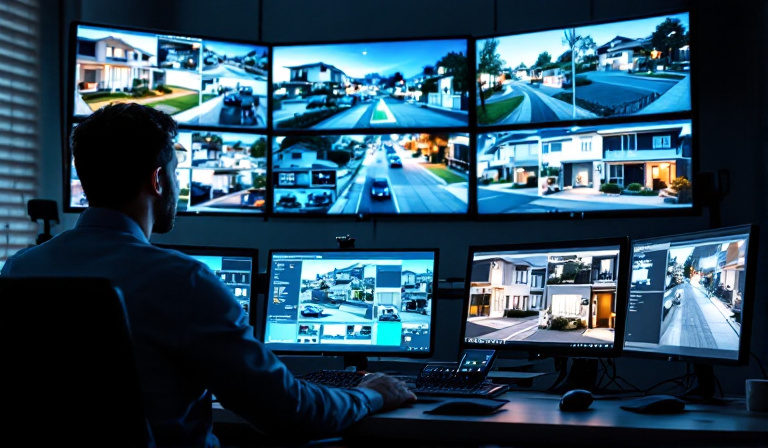
Signing up for professional monitoring can be a pivotal step in enhancing your safety and peace of mind. Whether it's for your home, business, or personal well-being, understanding what to expect during this process can help you make informed decisions and maximize the benefits of the service. In this comprehensive guide, we'll walk you through what professional monitoring entails, key considerations to keep in mind, and how to make the most of your investment.
Understanding Professional Monitoring
Professional monitoring refers to a service where trained security experts oversee your security system, alerting you and the authorities in case of any suspicious activity. This service is typically associated with home security systems, but it can also include health monitoring, environmental monitoring, and more. The goal is to provide an extra layer of protection by ensuring that someone is always watching over your property or well-being.
Initial Setup and Installation
The first step in signing up for professional monitoring is the initial setup and installation. This process varies depending on the type of monitoring service you choose but generally includes:
- Consultation: A consultation with a security expert to discuss your needs and assess your property. This is a crucial step to customize the monitoring system according to your specific requirements.
- Equipment Installation: Once a plan is in place, professional technicians will install the necessary equipment. This might include cameras, sensors, alarms, and control panels.
- System Integration: The equipment will be integrated into a central system that communicates with the monitoring center. This system is often accessible via a mobile app or web portal, allowing you to monitor your property remotely.
Types of Monitoring Services
Professional monitoring services can be categorized into several types, each serving different purposes:
- Intrusion Monitoring: Detects unauthorized access or break-ins and alerts the monitoring center.
- Fire and Smoke Monitoring: Uses smoke detectors and heat sensors to notify the monitoring service of potential fire hazards.
- Medical Alert Monitoring: Provides immediate assistance in case of health emergencies, often used by elderly or individuals with medical conditions.
- Environmental Monitoring: Monitors environmental factors like carbon monoxide levels, water leaks, and temperature changes.
What Happens During an Alert
When the security system detects an unusual event, an alert is sent to the monitoring center. Here's what typically happens:
- Verification: The monitoring center verifies the alert by attempting to contact you or a designated contact person to confirm any suspicious activity.
- Response: If the alert is verified as legitimate or if there is no response, the monitoring service will contact the appropriate emergency services, such as police, fire department, or medical responders.
- Follow-Up: After the situation is resolved, the monitoring service may provide a follow-up report detailing the incident and any actions taken.
Benefits of Professional Monitoring
Opting for professional monitoring offers several advantages:
- 24/7 Protection: Continuous monitoring ensures that your property or health is protected at all times, even when you're asleep or away.
- Rapid Response: Professional monitoring services ensure a swift response to any emergencies, minimizing potential damage or harm.
- Peace of Mind: Knowing that experts are watching over your property or well-being allows you to relax and focus on other aspects of your life.
- Insurance Benefits: Having a monitored security system may reduce your insurance premiums as it lowers the risk of theft or damage.
Choosing the Right Monitoring Service
To ensure you select the best monitoring service for your needs, consider the following tips:
- Assess Your Needs: Determine what type of monitoring is most important for you. This will help narrow down your options.
- Research Providers: Look for reputable providers with positive customer reviews and a proven track record.
- Compare Costs: Understand the pricing structure, including installation fees, monthly charges, and any additional costs.
- Evaluate Technology: Ensure the provider uses up-to-date technology and offers user-friendly apps or interfaces.
- Check Contract Terms: Read the contract carefully to understand the terms, cancellation policy, and any penalties for early termination.
Frequently Asked Questions
Here are some common questions about professional monitoring:
- Is professional monitoring necessary? While not mandatory, it provides an added layer of security and peace of mind.
- Can I monitor my system myself? Yes, many systems offer self-monitoring options, but professional monitoring ensures a prompt response to emergencies.
- What happens during a power outage? Most systems have battery backups to continue functioning during power interruptions.
- How secure is my data? Reputable providers use encryption and other security measures to protect your data.
In conclusion, signing up for professional monitoring can significantly enhance your security and peace of mind. By understanding what to expect and carefully selecting a provider, you can ensure that you receive the maximum benefits from this valuable service. Whether for your home, business, or personal health, professional monitoring is a wise investment in your safety and well-being.

